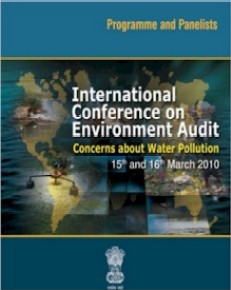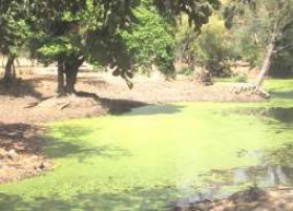Water Management
Seeds of Hope – Forestry - A Lokayan and Planning Commission study
Posted on 10 Sep, 2010 11:50 PMThis set of case studies is a part of a book prepared by Lokayan in collaboration with the Planning Commission titled “Seeds of Hope", covering themes of agriculture, biodiversity, education, forestry, governance, health, movements and water. The case studies related to forestry are summarized below:
International conference on environment audit - Concerns about water pollution - CAG (2010)
Posted on 10 Sep, 2010 05:15 PM This link on the CAG website provides the details of an international conference that was held on 15-16 March 2010, in the backdrop of the environmental audit proposed by the the Comptroller and Auditor General (CAG) of India, for management and conservation of the environment .
This link on the CAG website provides the details of an international conference that was held on 15-16 March 2010, in the backdrop of the environmental audit proposed by the the Comptroller and Auditor General (CAG) of India, for management and conservation of the environment .
The purpose of this conference was to deliberate on the causes of pollution, action taken by governments and civil society to address this and environmental, management and legal interventions needed to put lakes, rivers and ground water on the path of sustainability.
More than 20 experts on water and water pollution issues were invited to share their views as panelists during the conference. Apart from these distinguished panelists, the heads of supreme audit institutions from countries like Austria, Maldives, Bangladesh and Bhutan were also present to share their experiences regarding audit of water pollution in their countries.
National Training programme on Aqua chemical modeling – 2010, Department of Earth Sciences, Annamalai Nagar, Tamil Nadu
Posted on 07 Sep, 2010 09:06 AMOrganizer: Department of Earth Sciences
Seeds of Hope – Agriculture and Food Security - A Lokayan and Planning Commission study
Posted on 05 Sep, 2010 10:37 PMThis set of case studies is a part of a book prepared by Lokayan in collaboration with the Planning Commission titled “Seeds of Hope", covering themes of agriculture, biodiversity, education, forestry, governance, health, movements and water. The case studies related to agriculture and food security are summarised below:
Report of the exchange meeting on safeguarding future rural drinking water supply in Odisha, held at Bhubaneswar, between April 29-30, 2010
Posted on 05 Sep, 2010 10:23 PMA two day workshop on "Safe guard Future drinking water supply in Odisha", was organised on 29-30 April 2010. This event was as a result of cooperation between Gram Vikas, UNICEF, Deltares and ICCO (organisations involved in water supply and sanitation) and evolved out of a felt need to engage people from diverse fields to provide inputs for designing future courses of action.
Water Jobs via DevNetJobsIndia.org dated September 01, 2010
Posted on 01 Sep, 2010 05:17 PMContent Courtesy: DevNetJobsIndia
- Preparation of Project Implementation Plan for Jalanidhi II
Kerala Rural Water Supply & Sanitation Agency
Sanitation models in Trichy, Tamil Nadu
Posted on 01 Sep, 2010 04:19 PMA few weeks back I had the opportunity to visit a couple of partners in Tamil Nadu. These two partners are facing a difficult task—sanitation and hygiene implementation through community participation. One project is in the urban slums of Trichy while the other one is a rural project a few hours outside of Trichy. These communities have open defecation rates of 90%. The problem mostly lies on the women. Women feel embarrassed and ashamed to go out in the open, so as a result they only go in the early mornings or late at night—basically during pitch black. Menstrual Health is a topic that is only now being addressed with organizations developing their own branch of sanitary napkin production, sold cheaply to women in rural areas. In addition to the burden on women, open defecation pollutes water sources, thereby leading to diarrhea, one of the biggest killers of children in the developing world.
Restoration of traditional small water bodies in Braj - The South Asian Journal of Tourism and Heritage
Posted on 01 Sep, 2010 02:28 PM This paper published in the South Asian Journal of Tourism and Heritage begins by highlighting the importance of the traditional small water bodies in Braj, commonly known as kunds, as important freshwater sources as well as an important part of the culture and the traditions of the area.
This paper published in the South Asian Journal of Tourism and Heritage begins by highlighting the importance of the traditional small water bodies in Braj, commonly known as kunds, as important freshwater sources as well as an important part of the culture and the traditions of the area.
There were 1000 such kunds, which used to be the source of fresh water in Braj in earlier times. The water was used for multiple purposes like irrigated agriculture, domestic uses, drinking water for cattle, bathing etc. Due to rapid urbanisation, lack of maintenance and prolonged negligence in the last 50-100 years, most of the kunds today have become silted up and are nearing extinction.
The impending crisis for fresh water has forced the planners and policy makers to take cognizance of these traditional water bodies and an urgent need has been identified for taking necessary measures to restore the kunds. The present study thus aims at understanding the reasons for deterioration of the kunds and makes some technical suggestions for revival of these kunds.
Rapid investigations to assess impacts of aquifer recharge - Tumkur district (Karnataka) - A report by ACWADAM and BIRD-K
Posted on 01 Sep, 2010 02:19 PMThis report by ACWADAM is a synopsis of the hydrogeological study carried out for BIRD-K in Pavagada, Sira and Bagepalli areas of Tumkur District, Karnataka. The study aimed at an impact analysis of recharge through borewells as well as suggesting new sites for the same.
The principle objectives of the study were:
- Impact analysis of aquifer recharge through borewells done by BIRD-K in Pavagada and Sira Clusters
- Suggest new sites for aquifer recharge through borewells in Bagepalli cluster.
The methodology used a background study of the area through images from Google Earth. A detailed geological fieldwork in the area was carried out. Various structural and hydrogeological measurements were made to map out the aquifer systems within the area. Water levels in borewells and dug wells were measured. The study area included seven watersheds and falls in two clusters namely Pavagada and Sira. Both these clusters are located in the Tumkur district of Karnataka.
Babhli water conflict: Less water, more politics - EPW article
Posted on 01 Sep, 2010 02:13 PMThis paper published in the Economic and Political Weekly highlights the recently growing conflicts over water sharing between states in India and argues that the intensity and periodicity of these conflicts are increasing and that these conflicts are expected to get worse with the increasing uncertainty of rainfall and water availability. The document goes on to describe the latest one in the news, the conflict between Maharashtra and Andhra Pradesh over the Babhli barrage.







